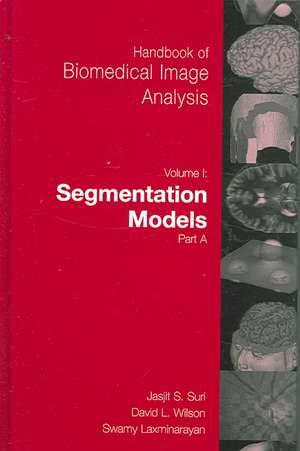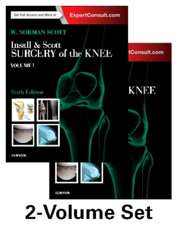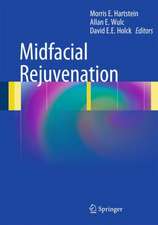Handbook of Biomedical Image Analysis: Volume 1: Segmentation Models Part A: Topics in Biomedical Engineering. International Book Series
Editat de David Wilson, Swamy Laxminarayanen Limba Engleză Hardback – 9 iun 2005
This volume is aimed at researchers and educators in imaging sciences, radiological imaging, clinical and diagnostic imaging, physicists covering different medical imaging modalities, as well as researchers in biomedical engineering, applied mathematics, algorithmic development, computer vision, signal processing, computer graphics and multimedia in general, both in academia and industry .
Key Features:
- Principles of intra-vascular ultrasound (IVUS)
- Principles of positron emission tomography (PET)
- Physical principles of magnetic resonance angiography (MRA).
- Basic and advanced level set methods
- Shape for shading method for medical image analysis
- Wavelet transforms and other multi-scale analysis functions
- Three dimensional deformable surfaces
- Level Set application for CT lungs, brain MRI and MRA volume segmentation
- Segmentation of incomplete tomographic medical data sets
- Subjective level sets for missing boundaries for segmentation
| Toate formatele și edițiile | Preț | Express |
|---|---|---|
| Paperback (1) | 2884.71 lei 6-8 săpt. | |
| Springer Us – 26 noi 2014 | 2884.71 lei 6-8 săpt. | |
| Hardback (2) | 2460.98 lei 6-8 săpt. | |
| Springer Us – 9 iun 2005 | 2460.98 lei 6-8 săpt. | |
| Springer Us – 9 iun 2005 | 2493.24 lei 38-44 zile | |
| Mixed media product (1) | 1519.73 lei 6-8 săpt. | |
| Springer Us – 9 iun 2005 | 1519.73 lei 6-8 săpt. |
Preț: 2460.98 lei
Preț vechi: 2590.51 lei
-5% Nou
Puncte Express: 3691
Preț estimativ în valută:
470.97€ • 489.88$ • 388.81£
470.97€ • 489.88$ • 388.81£
Carte tipărită la comandă
Livrare economică 14-28 aprilie
Preluare comenzi: 021 569.72.76
Specificații
ISBN-13: 9780306485503
ISBN-10: 0306485508
Pagini: 648
Ilustrații: XVIII, 648 p. 274 illus., 10 illus. in color.
Dimensiuni: 178 x 254 x 41 mm
Greutate: 1.46 kg
Ediția:2005
Editura: Springer Us
Colecția Springer
Seria Topics in Biomedical Engineering. International Book Series
Locul publicării:New York, NY, United States
ISBN-10: 0306485508
Pagini: 648
Ilustrații: XVIII, 648 p. 274 illus., 10 illus. in color.
Dimensiuni: 178 x 254 x 41 mm
Greutate: 1.46 kg
Ediția:2005
Editura: Springer Us
Colecția Springer
Seria Topics in Biomedical Engineering. International Book Series
Locul publicării:New York, NY, United States
Public țintă
ResearchCuprins
A Basic Model for IVUS Image Simulation.- Quantitative Functional Imaging with Positron Emission Tomography: Principles and Instrumentation.- Advances in Magnetic Resonance Angiography and Physical Principles.- Recent Advances in the Level Set Method.- Shape From Shading Models.- Wavelets in Medical Image Processing: Denoising, Segmentation, and Registration.- Improving the Initialization, Convergence, and Memory Utilization for Deformable Models.- Level Set Segmentation of Biological Volume Datasets.- Advanced Segmentation Techniques.- A Region-Aided Color Geometric Snake.- Co-Volume Level Set Method in Subjective Surface Based Medical Image Segmentation.
Notă biografică
Jasjit Suri, Ph.D. has spent the last 20 years in the field of computer and electrical engineering, and more than a decade in imaging sciences. Dr. Suri has a masters in computer sciences from the University of Illinois, a doctorate from the University of Washington, Seattle, and will soon receive his EMBA from the Weatherhead School of Management at Case Western Reserve University, Cleveland, Ohio. Dr. Suri has published over 100 technical publications in medical imaging, is a senior member of IEEE, member of the engineering honor societies Eta-Kappa-Nu and Tau-Beta-Phi, and a recipient of the President's Gold Medal in 1980. Prof. Swamy Laxminarayan, D.Sci. championed the field of Biomedical Engineering for over 30 years having held a variety of senior positions within the industry. He is an internationally recognized scientist, engineer, and educator with over 200 technical publications in biomedical information technology, computation biology, signal and image processing, biotechnology, and physiological system modeling. Prof. Laxminarayan is a fellow of AIMBE and a recipient of IEEE 3rd Millennium Medal.
Textul de pe ultima copertă
Handbook of Biomedical Image Analysis: Segmentation Models (Volume I) is dedicated to the segmentation of complex shapes from the field of imaging sciences using different mathematical techniques.
This volume is aimed at researchers and educators in imaging sciences, radiological imaging, clinical and diagnostic imaging, physicists covering different medical imaging modalities, as well as researchers in biomedical engineering, applied mathematics, algorithmic development, computer vision, signal processing, computer graphics and multimedia in general, both in academia and industry .
Key Features:
- Principles of intra-vascular ultrasound (IVUS)
- Principles of positron emission tomography (PET)
- Physical principles of magnetic resonance angiography (MRA).
- Basic and advanced level set methods
- Shape for shading method for medical image analysis
- Wavelet transforms and other multi-scale analysis functions
- Three dimensional deformable surfaces
- Level Set application for CT lungs, brain MRI and MRA volume segmentation
- Segmentation of incomplete tomographic medical data sets
- Subjective level sets for missing boundaries for segmentation
About the Editors:
Jasjit Suri, Ph.D. has spent over 20 years in the field of computer and electrical engineering, and more than a decade in imaging sciences. Dr. Suri has a masters degree in computer sciences from the University of Illinois and a doctorate in Electrical Engineering from the University of Washington, Seattle. Dr. Suri has published over 125 technical publications in medical imaging, as well as being a senior member of IEEE and a member of the engineering honor societies Eta-Kappa-Nu and Tau-Beta-Phi, and a recipient of the President's Gold Medal in 1980. He is also a fellow of American Institute of Medical and Biological Engineering.
David Wilson, Ph D. is a Professor of Biomedical Engineering and Radiology at Case Western Reserve University, having gained his doctorate from Rice University. He has over 60 refereed journal publications and is co-owner of several patents. Professor Wilson has actively developed biomedical imaging at CWRU. He has led a faculty recruitment effort, and he has served as PI or has been an active leader on multiple research and equipment developmental awards given to CWRU, including an NIH planning grant award for an in vivo Cellular and Molecular Imaging Center and an Ohio Wright Center of Innovation award. Swamy Laxminarayan, Dsc championed the field of Biomedical Engineering for over 30 years, having held a variety of senior positions within the industry. He is an internationally recognized scientist, engineer, and educator and has been published in over 200 technical publications in biomedical information technology, computation biology, signal and image processing, biotechnology, and physiological system modeling. Prof. Laxminarayan is a fellow of AIMBE and a recipient of IEEE 3rd Millennium Medal.
This volume is aimed at researchers and educators in imaging sciences, radiological imaging, clinical and diagnostic imaging, physicists covering different medical imaging modalities, as well as researchers in biomedical engineering, applied mathematics, algorithmic development, computer vision, signal processing, computer graphics and multimedia in general, both in academia and industry .
Key Features:
- Principles of intra-vascular ultrasound (IVUS)
- Principles of positron emission tomography (PET)
- Physical principles of magnetic resonance angiography (MRA).
- Basic and advanced level set methods
- Shape for shading method for medical image analysis
- Wavelet transforms and other multi-scale analysis functions
- Three dimensional deformable surfaces
- Level Set application for CT lungs, brain MRI and MRA volume segmentation
- Segmentation of incomplete tomographic medical data sets
- Subjective level sets for missing boundaries for segmentation
About the Editors:
Jasjit Suri, Ph.D. has spent over 20 years in the field of computer and electrical engineering, and more than a decade in imaging sciences. Dr. Suri has a masters degree in computer sciences from the University of Illinois and a doctorate in Electrical Engineering from the University of Washington, Seattle. Dr. Suri has published over 125 technical publications in medical imaging, as well as being a senior member of IEEE and a member of the engineering honor societies Eta-Kappa-Nu and Tau-Beta-Phi, and a recipient of the President's Gold Medal in 1980. He is also a fellow of American Institute of Medical and Biological Engineering.
David Wilson, Ph D. is a Professor of Biomedical Engineering and Radiology at Case Western Reserve University, having gained his doctorate from Rice University. He has over 60 refereed journal publications and is co-owner of several patents. Professor Wilson has actively developed biomedical imaging at CWRU. He has led a faculty recruitment effort, and he has served as PI or has been an active leader on multiple research and equipment developmental awards given to CWRU, including an NIH planning grant award for an in vivo Cellular and Molecular Imaging Center and an Ohio Wright Center of Innovation award. Swamy Laxminarayan, Dsc championed the field of Biomedical Engineering for over 30 years, having held a variety of senior positions within the industry. He is an internationally recognized scientist, engineer, and educator and has been published in over 200 technical publications in biomedical information technology, computation biology, signal and image processing, biotechnology, and physiological system modeling. Prof. Laxminarayan is a fellow of AIMBE and a recipient of IEEE 3rd Millennium Medal.
Caracteristici
First time a work is being written which covers the role of image segmentation and image registration together Three-volume sets constitutes a real system for effective use in biomedical applications therapy, whether theory (the student) or application (the professional) Exclusively discusses the latest segmentation models applied to different body imaging and using different biomedical imaging modalities Have diagnostic systems using jointly the segmentation and registration algorithms














